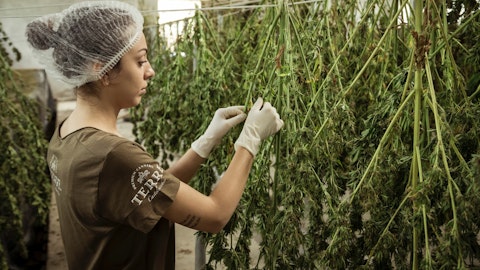And I could comfortably say that we’ve received many inbounds. There’s a high interest, because there’s a lot of companies that are capital constrained. So, we’re actively looking, and we are going to explore any of these, tested instruments that we’ve seen other people use, around how to get a compliant structure. But at the end of the day, look, we’re looking at several verticals. So if we’re looking at investing in MSOs, SSOs, or even brand plays, we recognize those are more difficult to structure, and those will probably take us a little bit longer. Where we expect that there’ll be an easier approach in the short-term would be IP-focused opportunities and hemp-derived THC plays that we could consolidate, and that can have a direct impact on us.
So, we’re already in conversations today with certain companies and we’re excited about the opportunity. But again, we’ll watch how other companies structure compliantly and learn from that. We don’t have to reinvent the wheel and we’re excited about these opportunities going forward.
Federico Gomes: Thank you very much, all that color. Thank you.
Operator: [Operator Instructions] Your next question comes from the line of Yewon Kang from Canaccord Genuity. Please go ahead.
Yewon Kang: Hi there. Good morning. Thank you for taking my question. This is Yewon Kang on for Map Bottomley. So I just wanted to ask a question about the international strategic investment arm that you guys, are trying to set up right now. I wanted to ask if those initial expectations in terms, of where you guys wanted to deploy that capital has changed at all in the past few months, just because one of your peers recently announced that, they’re going to be acquiring a medical cannabis company in Australia. And this has been a market that, has been ramping up quite a bit and seems that a lot of Canadian LPs are taking interest in that market. So just wanted to see if any of your expectations have kind of gone away from U.S. focused into more international focused? Thanks.
Beena Goldenberg: Thank you for your question. So, when we originally announced Project Jupiter, we did say we would have a strong focus on the U.S., but we also left room for international markets. And we are interested in exploring markets like Germany and markets like Australia. Obviously, we ship our export business to both Australia, and we’ve just shipped to Germany. And we expect to actually ship any time now to the U.K. So there are other markets that are interesting. And those markets will allow us to have a more direct impact on our business versus the US. So there’s going to be a balancing approach. We will do some investments in some of those other markets, and we’ll see what are, the best opportunities for us that meets our long-term strategic goals.
But a good chunk of the Jupiter investment will happen in the U.S. Because that is an opportunity for the future that we want to set ourselves up for. So yes, we’ll look at Australia and we’ll look at Germany and we’ll see what the right opportunities are. And hopefully we’ll have news to share in the next few months.
Yewon Kang: Thank you for the color. I’ll jump back into the queue.
Operator: And we have no further questions in our queue at this time. I will now turn the call back to management for closing remarks.
Beena Goldenberg: Well, thank you, everybody, for joining the call today. As I could tell, there’s a lot of interest in our next steps on our Jupiter investment pool. And we’re equally excited about this next stage of Organigrams evolution. And we continue to be proud of the work we do every day in the domestic market in Canada. So, with that, I’ll close out today’s call, and look forward to updating you soon, on our second quarter. And as a reminder, please come out, to see our facility and come join us on our Investor Day in April. Thank you again for joining.
Operator: This concludes today’s conference call. Thank you for your participation and you may now disconnect.
Follow Organigram Holdings Inc. (NASDAQ:OGI)
Follow Organigram Holdings Inc. (NASDAQ:OGI)
Receive real-time insider trading and news alerts




